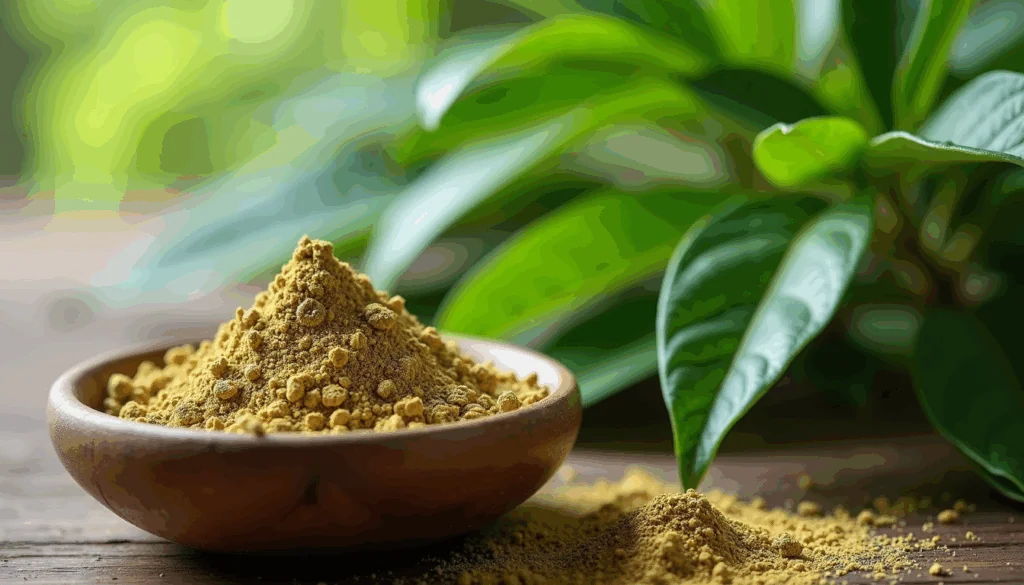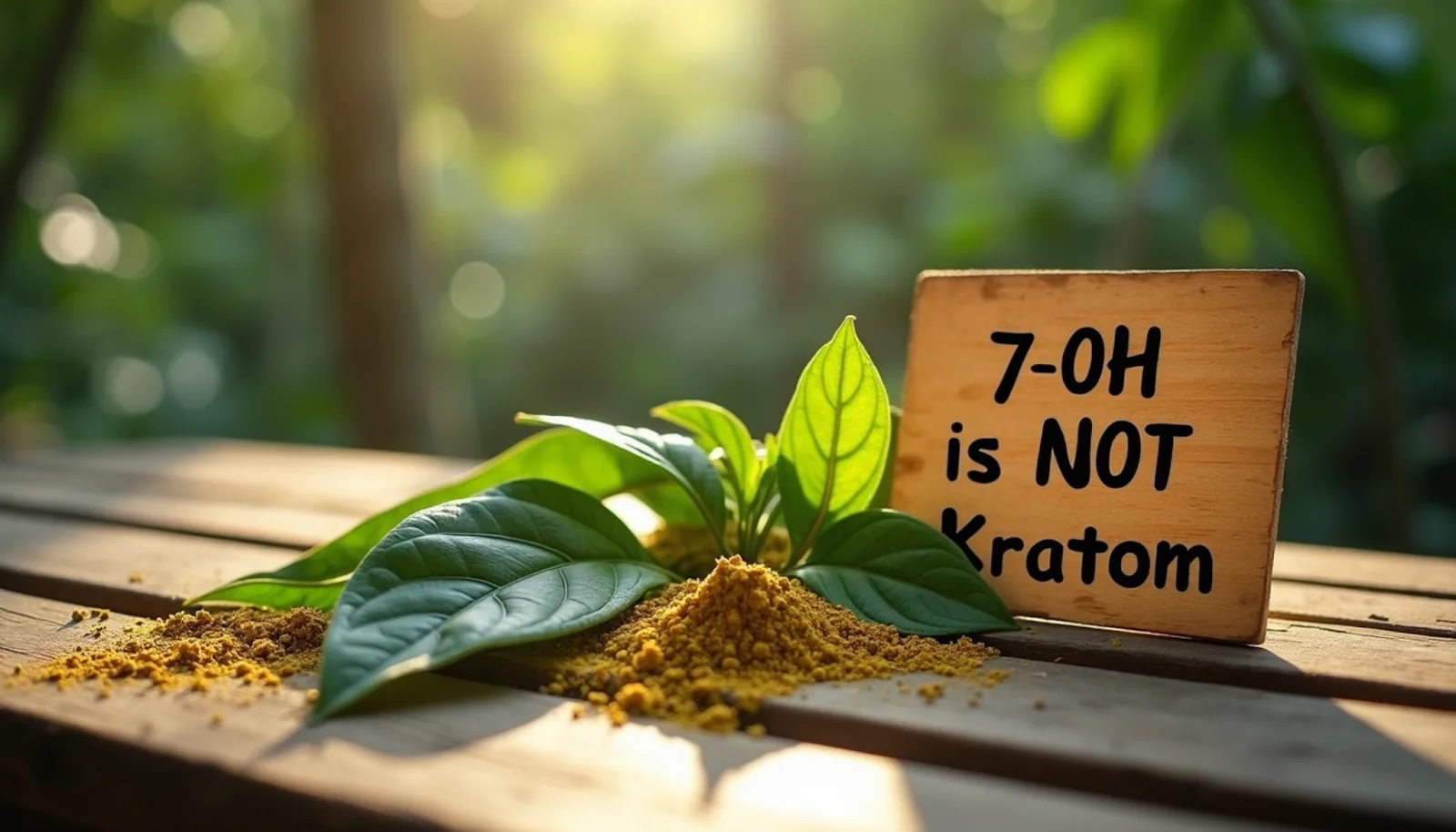Table of Contents
ToggleIf you’ve been exploring natural wellness supplements, you may have come across Kratom and 7-hydroxymitragynine (7-OH). While both come from the same source, the Kratom plant, they offer different experiences. In this guide, we’ll break down the key differences between Kratom and 7OH, how they work, their potential benefits, and why it matters when choosing a product that fits your wellness needs.
What is Kratom?
Kratom is a tropical tree native to Southeast Asia, scientifically known as Mitragyna speciosa. The leaves of this tree have been used for centuries as a traditional remedy for a variety of purposes. Today, Kratom is available in different forms such as powder, capsules, tinctures, and extracts, making it popular among wellness enthusiasts.
Kratom leaves contain natural alkaloids, with two of the most well-known being mitragynine and 7-hydroxymitragynine (7-OH). These alkaloids interact with the body in complex ways, contributing to Kratom’s energizing, relaxing, or mood-enhancing effects, depending on the dose and strain used.
What is 7-Hydroxymitragynine (7-OH)?
7-hydroxymitragynine (7-OH) is one of the most potent alkaloids found in the Kratom plant, though it exists in smaller amounts than other compounds like mitragynine. This powerful alkaloid can also form when mitragynine is metabolized in the body. For many Kratom users, 7OH offers a more targeted and intense effect, which is why it has become a popular choice in wellness products for users seeking more specific benefits.
7OH products typically provide a more potent experience and are often favored by individuals who have already used other Kratom-based supplements and are looking for a more consistent and precise experience.
How Are Kratom and 7-OH Different?
While Kratom and 7OH come from the same plant, they are distinct compounds with varying effects:
Source
- Kratom: Kratom is a whole plant product that contains a variety of alkaloids. These alkaloids, like mitragynine, contribute to Kratom’s overall effects.
- 7-OH: 7OH is a specific alkaloid found in Kratom and is typically isolated for its higher potency. While it occurs naturally in the plant, it is often extracted in concentrated forms for use in wellness products.
Potency
- Kratom: Kratom powder and capsules contain varying concentrations of alkaloids, which can make the effects inconsistent depending on the strain, source, and batch.
- 7-OH: 7OH is much more potent than Kratom’s other alkaloids, often providing stronger effects at smaller doses. Products containing 7OH Tablets offer consistent dosing, which leads to more predictable results.
Form
- Kratom: Typically available in powder or capsule form, which can be difficult to dose consistently.
- 7-OH: Often available in tablet, liquid, or shot forms, which makes it easier to manage the dose and eliminates the bitterness of Kratom powder.

Effects
- Kratom: Depending on the strain and dosage, Kratom can provide energizing effects (stimulatory) or calming effects (sedative). It’s used for a variety of purposes, including pain relief, mood elevation, and increased focus.
- 7-OH: 7OH products tend to have stronger calming and pain-relieving effects. Many users find that 7OH provides enhanced relaxation, stress relief, and even helps with sleep. At higher doses, it can provide sedative effects, which makes it ideal for nighttime use.
Legal and Regulatory Status
The legal status of Kratom and 7OH can be complex and varies by location. While Kratom is legal in many U.S. states, it is not FDA-approved, and the FDA has issued several warnings regarding its use. In some states, Kratom has been banned, and in others, there are restrictions on its sale and distribution.
Since 7OH is a compound derived from Kratom, its legal status generally follows the same regulations. However, some states may have specific laws regarding the concentration of 7OH in Kratom products. As always, it’s important to check your local regulations before purchasing or consuming any Kratom or 7OH product.
Safety Considerations and Responsible Use
Both Kratom and 7OH can offer significant benefits when used responsibly, but they also come with risks, especially when misused or taken in excessive amounts. Here are a few safety tips:
- Start with a Low Dose: If you’re new to Kratom or 7OH, start with a low dose and gradually increase as you gauge how your body responds.
- Stay Hydrated: Drink plenty of water, as both Kratom and 7OH can cause dry mouth.
- Avoid Mixing with Alcohol: Never mix Kratom or 7OH products with alcohol or prescription medications without consulting a healthcare provider.
- Monitor Your Usage: Avoid overuse to prevent building a tolerance. It’s important to take breaks between doses to maintain their effectiveness.
Can You Build Tolerance to Kratom or 7-OH?
Yes, it’s possible to build tolerance to Kratom and 7OH if they are used too frequently. This means that you may need higher doses to experience the same effects, which can increase the risk of side effects and dependence.
To avoid tolerance buildup, consider cycling your use of Kratom and 7OH products. Taking regular breaks and consulting with a healthcare provider can help keep your usage responsible and effective.
Key Takeaways
- Kratom is a whole plant product that contains various alkaloids, including mitragynine and 7-hydroxymitragynine (7-OH).
- 7OH is a highly potent alkaloid found in Kratom, offering more targeted and intense effects, especially for pain relief and relaxation.
- Kratom can be consumed in powder or capsule form, while 7OH is often found in tablets, liquids, or shots for more precise dosing.
- Both Kratom and 7OH products have legal considerations that vary by state or country, so it’s important to stay informed about local regulations.
- Always use these products responsibly and consult a healthcare provider if you’re unsure about dosage or interactions with other medications.
Final Thoughts: Understanding Kratom and 7OH
Both Kratom and 7OH are powerful compounds derived from the same plant but offer distinct experiences. Understanding their differences can help you make informed choices about which product best suits your wellness goals.
For anyone considering Kratom or 7OH products, it’s important to start slow, listen to your body, and consult a healthcare professional for guidance on safe usage.




